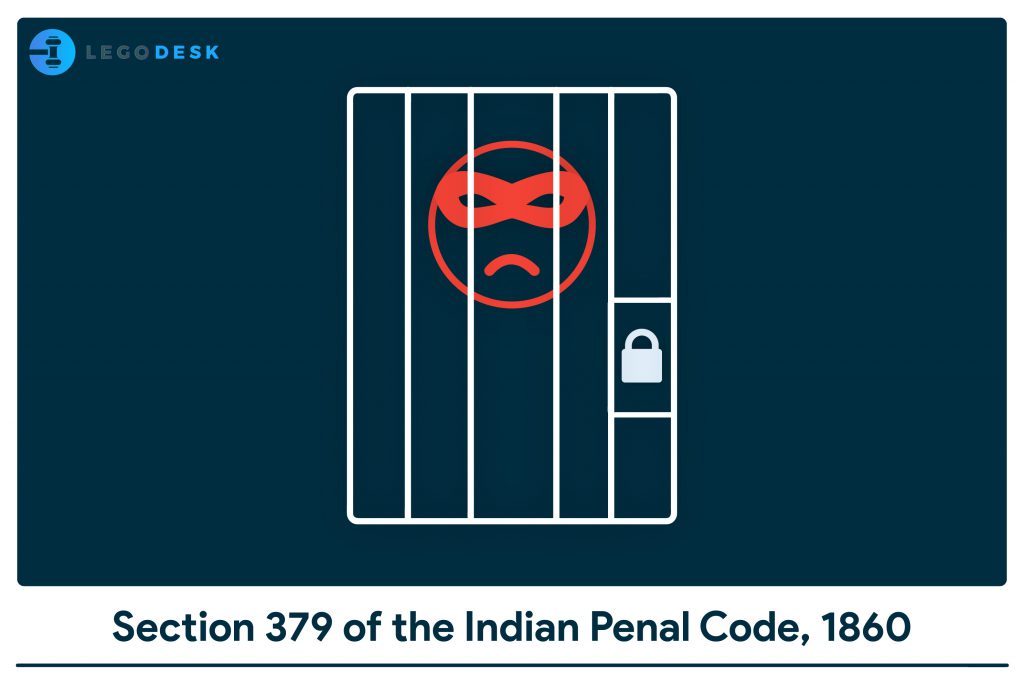Section 379 of the Indian Penal Code, 1860

Introduction
Section 379 is dealing with the punishment for theft. The offence of theft is included in Chapter XXVII of the Indian Penal Code.
Theft: Section 378
Whoever, intending to take dishonestly any movable property out of the possession of any person without that person’s consent, moves that property in order to such taking is said to commit theft. Some of the essential elements of the offence of ‘theft’ under Section 378 are:
1) Dishonest Intention
Whoever does anything with the intention of causing wrongful gain to one person or wrongful loss to another person, is said to do that thing dishonestly as per Section 24 of IPC. The intention is a mental element. It is proved through the circumstantial evidence.
In the case of Emperor vs. Naushe Ali Khan[1], a man snatched books out a boy’s hand who was coming out of school and asked him to come to his house to collect the books. His intention was to commit an unnatural offence. Thus, this amounted to theft under Section 379.
2) Movable Property
The subject of theft should be a movable property. A movable property can be a corporeal property of every description, except land and things attached to the earth or permanently fastened to anything which is attached to the earth. Furthermore, the things attached to the earth may become movable property by severance from the earth, and such act of severance itself will be theft.
Animals can be a subject of theft. However, fishes cannot be stolen from a pond.[2] Although stealing fishes would be theft if it is from an enclosed tank.[3] Likewise, Human corpse is no property, but anatomical specimens are, and thus, they can be a subject of theft. Water from the river is not subject to theft; however, if it is stolen from an irrigating canal, it would be theft.
3) Possession
Possession exists in one whenever he has physical control, whether rightful or wrongful, over a corporeal thing. It may be de facto or de jure. De facto possession is mere custody and is no actual possession.[4] De jure possession is a constructive possession, i.e., there is no physical control, but possession exists in the eye of law. When there are several joint owners in joint possession of the land, and anyone of them dishonestly takes exclusive possession, he will be guilty of theft.
In the case of Pyarelal Bhargava vs. State of Rajasthan[5], the employee took a file from the office and replaced it. Here the court adjudges that even a temporary deprivation caused to the original owners amounts to theft.
4) Without Consent
The taking must be without the consent of the person in possession. Here, the consent can either be expressed or implied. A seizure of vehicle due to default in payment of instalments cannot be construed as theft.[6]
5) Moving or Taking Away
There must be actual moving of property with the intention of taking it. A person is said to move a thing by removing an obstacle which prevented it from moving. A person who by means causes an animal to move is said to move that animal and to move everything which in consequence of the motion so caused is moved by that animal.
Read Also – Top 5 Advantages and Disadvantages of Section 498A IPC
Punishment for Theft: Section 379
Section 379 provides for punishment when an offence of theft is committed. A punishment of imprisonment of either description for a term which may extend to three years, or fine or both is provided.
Aggravated Forms of Theft: Section 380-382
If a theft is committed in any building, tent, vessel which is used as a human dwelling or as custody of property is punishable with imprisonment which may extend to about 7 years and fine, according to Section 380 of the Indian Penal Code. Theft by a clerk or servant of the property is also punishable with an imprisonment of 7 years along with fine.[7]
If thief in order to ensure the commission of theft or effecting escape after the commission or to restrain the properties, had made preparation for causing death or hurt or restraint to any person, he would be punished with rigorous imprisonment for a term which may extend to ten years, and shall also be liable to fine in accordance with Section 382 of the Indian Penal Code.
Conclusion
Theft is an increasing crime. Its aggravated forms are not only limited to Section 380- Section 382. Robbery is also regarded as an aggravated form of theft due to its elements.
Dishonestly taking away of property from a person is unethical as well as a punishable offence. The tremendous increase in crime is a huge concern as it not only affects a person physically but also financially and mentally.
[1] (1912) ILR 34 All 89.
[2] State Of Rajasthan vs. Pooran Singh, 1977 CriLJ 1055.
[3] Chandi Kumar Das v. Abandhir Roy, AIR 1965 SC 585.
[4] R v. Thompson, (1869) 11 Cox C.C. 362.
[5] 1963 AIR 1094.
[6] Ransom HJ vs. Triloknath, AIR 1942 Oudh 318.
[7] Section 381, Indian Penal Code 1860.
Try our Debt Resolution solutions today Request a Demo